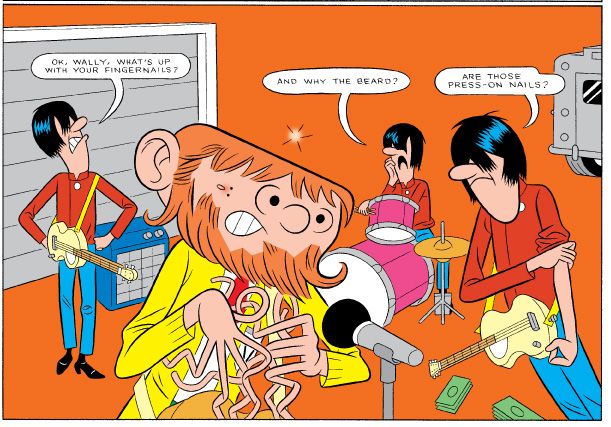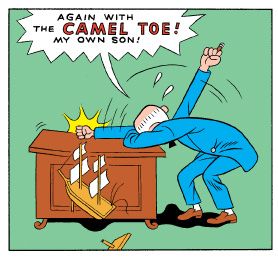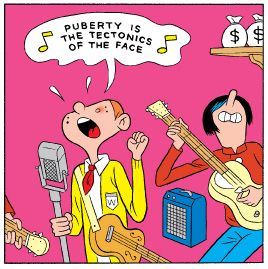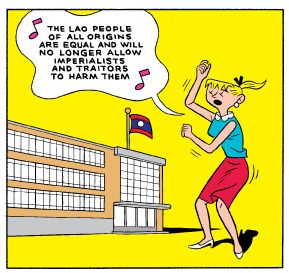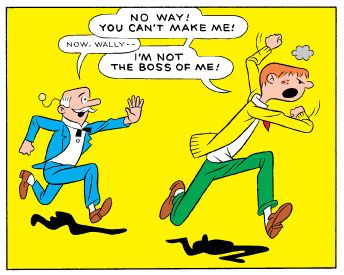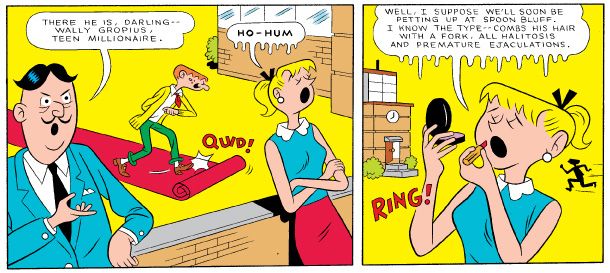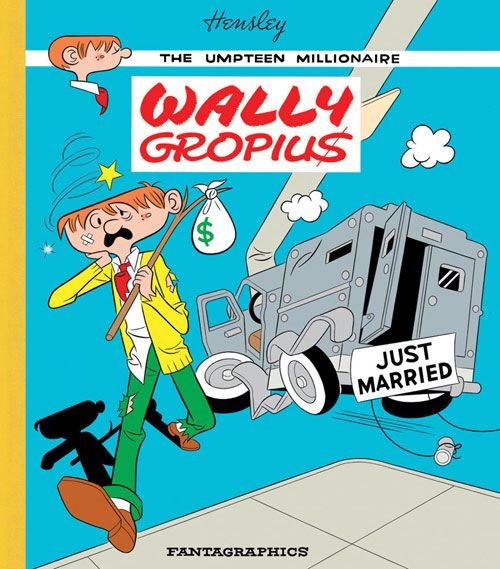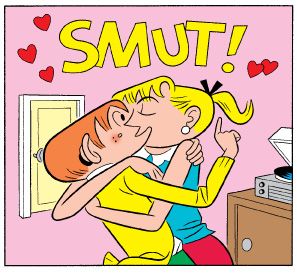If my review the other week didn't make it clear, I'm a big fan of Wally Gropius, Tim Hensley's ingenious, hilarious and occasionally disturbing take on classic teen comics. So when the opportunity to interview Hensely came, I leapt at it. He's been in the comics press a lot lately (something I reference an embarrassing amount of times during our talk) so I made a bit of an effort to build off of what had been said in past interviews. Whether or not I was successful in my efforts, hopefully you'll be inspired enough to check out the book, which really deserves as much attention as it can muster.
In your initial email you mentioned a past career doing closed-captioning. Out of sheer curiosity, (and assuming you aren't rolling in money from the sales of Wally Gropius) what do you do for a living when you're not working in comics, and how, if at all, does it inform your comics work?
Right now, after a long period of unemployment and being totally broke, I'm working as a temp in the advertising arm of a global internet company reviewing sponsored links to pornography before they go online. So, basically scrolling down to find the age disclaimer and making sure there's no caning or whatever. (If you hear from HR, I wasn't filling this interview out on the clock.) Mostly the ways I have scraped together a living have actively interfered with comics. It seems like it will always be a struggle and one I will increasingly be on the losing side of the older I get.
Correct me if I'm wrong, but I seem to recall in the Mome interview you did that you had stepped aside from making comics for a long time before deciding to dive back in. Am I correct about this? If so, what was the reason you opted to bow out and what made you decide to try again?
I was first published in Duplex Planet Illustrated in 1993; I next appeared in Dirty Stories in 2002. I didn't gain the confidence to contribute my own work for publication until much later in life. But I also mostly do things because people ask more often than I stride out with a machete. I was invited to contribute to Zero Zero, but I'm glad I didn't because I wasn't ready. I mean, you're sort of never ready, but you can pick up a lot once you actually start.
Can I ask you to elaborate a little bit by what you mean by "ready"? How do you define "ready?" And what happened between Zero Zero and Mome (and Dirty Stories) that made you feel more confident about your work?
I didn't have a point of view yet. I'd start sketchbooks with tiny drawings and unpublishable self-perpetuating "Dear Diary" type writing, but would always end up giving up four pages in, tearing them out, and putting them in a file folder. I cracked up a little and went into therapy for a few years. I ended up reconnecting with my borderline mentally retarded sister and tried to get a handle on submerged emotional debris resulting from, among other things, her half-hearted suicide attempts when I was a teen. A significant event in my life before beginning Wally Gropius was when she had a near-fatal stroke on my birthday in 2004. I was at the hospital and watched her progressively lose her sight, her hearing, and then her speech. She had 2 seizures, then went on a ventilator. It was awful. So in a way, not much happened, and a lot happened. I think it wasn't until I started reading histories of mental retardation that I found a way to define myself in society that made any sense.
Wally Gropius is, on the surface, a parody of Archie and the other teen/kid comics of the mid to late 20th century. You've talked in past interviews about your love/hate relationship with those comics. Can you go into a little more detail about your feelings toward them? What exactly "infuriates" you about those books (as you said in the LA Times interview)? And conversely, what do you like about them and why?
I love the gestural figure drawing, how the pages almost look like Egyptian murals. They are engineered for comfort and have an appealing boilerplate goofiness. In the mental retardation histories, it's all stuff about the Kallikak family who are a falsified cursed lineage of criminals. That's a perception I can understand and find my place in; that's why I love the villains in Dick Tracy. Comics like, you know, Tippi Teen seem to me to come at it from the opposite direction. Sometimes it's infuriating to read about a bunch of attractive saccharine pupils in the suburbs. Maybe they could add a brain damaged character. Maybe Moose, but more likely he never learned to read -- have they already done that? Somewhere off-panel there's a convalescent hospital with all the rejects in it. But I wasn't attempting a Dark Knight makeover where everyone has stubble and never prevaricates. I really was just trying to draw a faithful-in-my-own-way version. There's part of me that instantly can't relate to these comics and longs for them at the same time. I'm sure that's pretty common.
Based on what you're saying, I get the feeling there are some real, personal, painful elements that inform Gropius, even though it's not strict autobiography. Is that accurate? How did your relationship with your sister and the rest of your family inform this work?
I was more trying to account for my "lost years," and explain how my art may have blossomed like a tea kettle starts whistling after enough boiling. I think it is correct to say "personal, painful elements" inform the work, but are not what the work is exactly about. I don't recognize my family in the characters; I consider comics something of an escape.
How did the book come together? Did you have the story well plotted out ahead of time or did you let it flow organically as you went along?
I drove to the library after work and wrote the entire script in advance in various study carrels. The flow was more in illustrating the text. It was sometimes years later when I'd start to fill in a page I had lettered. If I thought a joke was no longer funny, I'd try to fix it with the drawing.
You talk a little bit about this in your interview with Eric Reynolds, but there's a very shocking scene midway through the book between Jillian and Dad that pretty much forces the reader to completely rethink where you're going and really undercuts the previous (relatively) lighthearted atmosphere. What was your intention with that scene? Were you trying to say something about the weird sexual relationships that seem to pervade a lot of Archie-type comics?
I'm tempted to just copy and paste my answer from the other interview. I'm not sure there really are sexual relationships in teenager comics. Essentially Betty and Veronica visually are the same girl with different hair coloring, and nothing ever happens between them or Archie; the dynamic is similar to Krazy Kat. It seems like there's a fair amount of arguments between authorities and parents and offspring about what might happen though. The scene can be "very shocking," as you say, but I don't think it is gratuitous. Now that I have this temp job looking at pornography all day, it seems pretty tame.
One of the reasons I ask that question is, even though it's revealed later that the relationship is not what we thought it was, you have the characters acting in that previous scene as if they are indeed related, even though there's no one in that scene to keep up a pretense for. It's as though they're putting on a show specifically for the reader. Are you engaging in a bit of fourth-wall breaking?
That's an interesting idea. Just yesterday in Doonesbury, a character told another not to read the paper because they're in it. I imagined they were role playing with each other. I thought if the relationship seemed phony enough it might imply Wally would have more of a chance, which he of course never does.
Why did you decide to design the collected version of Wally in the style of the classic European BD albums? Is there some aspect to the story and his character that is tied into that tradition?
I've never been prolific and my work has always been more about compression, so for a publishing model I couldn't shoot for a Blankets or Bottomless Belly Button because they just have too many pages. Some cartoonists get around this problem with the old panel-a-page trick; if I had tried that, I'd have something like 275 pages--still not enough. The Tintin books seemed like a good model to emulate instead. They were a length I could actually achieve. It probably also plays into the national anthem content in the book to make the design sort of un-American.
One of the more notable things about the book to me, art wise, was your minimalist use of backgrounds and space. What made you opt to go in that direction?
I think because the art was in color. I was influenced by stuff like the book The Snoopy Festival that has reprints of Peanuts Sundays with this sort of psychedelic housewife color scheme I found appealing. I still plot the perspective in every panel; I just don't draw everything that's inside. It's kind of like how on reality shows they block out someone's face, but the other way around.
One of the things that struck me about the book is how you play with the language, not just in making puns or onomatopoeia (I love the money-related sound effects), but in twisting around cliched phrases (like Gropius' "I'm not the boss of me"). Where does that interest in punnery, etc. come from?
Wordplay has always come pretty easily for me compared to the little things like, you know, characters and a plot. I think at heart part of it is, again, growing up a sibling of somebody learning disabled. My sister has always been saying things like "cell-o-phone" for cell phone, and her living companions have often been mentally ill folks off on some tangent I'm desperately trying to fathom. I definitely went through a high school phase of stuff like Joyce and Nabokov and Barthelme and all that, but now I like reading the opposite, something like New Grub Street.
What are you working on now? I noticed you're doing a Alfred Hitchcock tribute of sorts over at Blog Flume. What inspired that? Are you planning on collecting those strips? Will you be contributing to Mome anytime again in the near future?
I got the book Spellbound by Beauty from the library, and while it was a weird hatchet job, it had anecdotes where I'd think, "That would make a good comic strip," so I just started trying to draw one. I then went through some more Hitchcock bios and thumbnailed anything that struck me. I'm not sure where the strips will ultimately end up. There has been a lot of derailing around this book release, like these interviews and the general anxiety regarding the exposure, so 4 panels at a time has been a good short term goal. I think I will get more work done when everything blows over. I was asked to be in Mome to serialize Wally, and now that it's done it feels like maybe others should take the reins. I really don't know how other cartoonists can crank out graphic novel after graphic novel. I still feel pretty exhausted. I feel like people expect me already to have written my next project, but I've never been that kind of person.

